

Christopher Hitchens. Yochai Benkler. Yochai Benkler speaking at UC Berkeley School of law in 2006 Yochai Benkler (born 1964) is an Israeli-American professor of Law and an author.
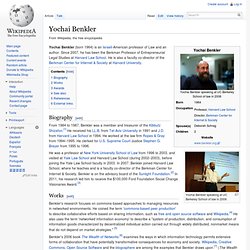
Since 2007, he has been the Berkman Professor of Entrepreneurial Legal Studies at Harvard Law School. He is also a faculty co-director of the Berkman Center for Internet & Society at Harvard University. Biography[edit] From 1984 to 1987, Benkler was a member and treasurer of the Kibbutz Shizafon.[1] He received his LL.B. from Tel-Aviv University in 1991 and J.D. from Harvard Law School in 1994. Albert Camus. Albert Camus (French: [albɛʁ kamy] ( Camus did not consider himself to be an existentialist despite usually being classified as one, even during his own lifetime.[1] In an interview in 1945, Camus rejected any ideological associations: "No, I am not an existentialist.
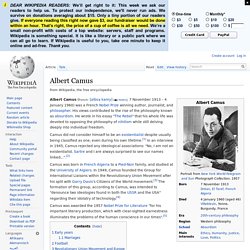
Sartre and I are always surprised to see our names linked... ".[2] Camus was born in French Algeria to a Pied-Noir family, and studied at the University of Algiers. In 1949, Camus founded the Group for International Liaisons within the Revolutionary Union Movement after his split with Garry Davis's Citizens of the World movement.[3] The formation of this group, according to Camus, was intended to "denounce two ideologies found in both the USSR and the USA" regarding their idolatry of technology.[4] Bertolt Brecht. Bertolt Brecht (English: /brɛkt/[1][2][3] German: [ˈbɛɐ̯tɔlt ˈbʁɛçt] ( ); born Eugen Berthold Friedrich Brecht ; 10 February 1898 – 14 August 1956) was a German poet, playwright, theatre director, and Marxist.
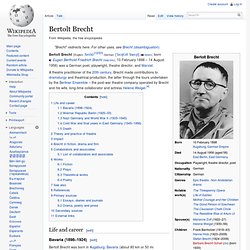
A theatre practitioner of the 20th century, Brecht made contributions to dramaturgy and theatrical production, the latter through the tours undertaken by the Berliner Ensemble – the post-war theatre company operated by Brecht and his wife, long-time collaborator and actress Helene Weigel.[4] Life and career[edit] Bavaria (1898–1924)[edit] Bertolt Brecht was born in Augsburg, Bavaria (about 80 km or 50 mi north-west of Munich), to a devout Protestant mother and a Catholic father (who had been persuaded to have a Protestant wedding). When he was 16, the First World War broke out. Stéphane Hessel. Stéphane Frédéric Hessel (20 October 1917 – 26 February 2013[2]) was a diplomat, ambassador, writer, concentration camp survivor, French Resistance member and BCRA agent.
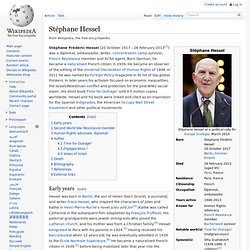
Born German, he became a naturalised French citizen in 1939. He became an observer of the editing of the Universal Declaration of Human Rights of 1948. In 2011 he was named by Foreign Policy magazine in its list of top global thinkers. In later years his activism focused on economic inequalities, the Israeli/Palestinian conflict and protection for the post-WW2 social vision. His short book Time for Outrage! EMPREINTES - STEPHANE HESSEL, SISYPHE HEUREUX. Gideon Levy. Gideon Levy (Hebrew: גדעון לוי; born 1953) is an Israeli journalist. Levy writes opinion pieces and a weekly column for the newspaper Haaretz that often focus on the Israeli occupation of the Palestinian territories.
George Orwell. Timothy Leary. TIMOTHY LEARY .: LaSpirale.org :. Où serait localisée notre conscience ?
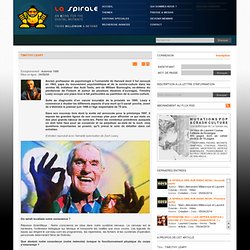
Réponse Scientifique : Notre conscience se situe dans notre système nerveux. Le cerveau est le hardware, l'ordinateur biologique qui fabrique et transporte les realités que nous vivons. Les logiciels de bases qui dirigent le cerveau sont les programmes, les répertoires, les fichiers et les systèmes d'opération personnels determinant l'âme de l'individu. Que devient notre conscience (notre mémoire) lorsque le fonctionnement physique du corps s'interrompt ? Reponse Scientifique : A moins d'employer des méthodes de conservation spécifiques, le cerveau commence à se décomposer dès la mort du corps. L'incinération offre plus de dignité que la putréfaction. LES RELIGIONS TOTALITAIRES interdisent l'incinération. Comment peut-on conserver le hardware du cerveau pour le réanimer suite a la mort physique du corps ?
Il existe trois méthodes scientifiques pour conserver le cerveau: 1. 2. 3. Seamus Heaney. Seamus Justin Heaney, MRIA (/ˈʃeɪməs ˈhiːni/; 13 April 1939 – 30 August 2013) was an Irish poet, playwright, translator and lecturer, and the recipient of the 1995 Nobel Prize in Literature.[1][2] In the early 1960s, he became a lecturer in Belfast after attending university there and began to publish poetry.
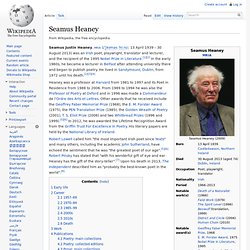
He lived in Sandymount, Dublin, from 1972 until his death.[2][3][4] Heaney was a professor at Harvard from 1981 to 1997 and its Poet in Residence from 1988 to 2006. From 1989 to 1994 he was also the Professor of Poetry at Oxford and in 1996 was made a Commandeur de l'Ordre des Arts et Lettres. Other awards that he received include the Geoffrey Faber Memorial Prize (1968), the E. M. Henry David Thoreau citations. « Henry David Thoreau » 3 personnes ont déjà ajouté cette célébrité à leurs favoris Ajouter à mes favoris Votre espace personnel sur Evene.fr vous permet de découvrir du contenu culturel qui vous correspond.

L'espace personnel, c'est un moteur de recommandations selon vos goûts.